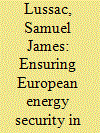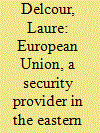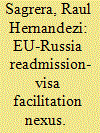| Srl | Item |
| 1 |
ID:
100929


|
|
|
|
|
| Publication |
2010.
|
| Summary/Abstract |
The Southern Energy Corridor (SEC), which aims to link Caspian Basin and potentially Middle East gas supplies to Europe, is one of the EU's six priority axes of energy infrastructures. Drawing on the external governance literature, the article provides an analysis of the EU's efforts in the wider Black Sea area to increase its energy security. It concludes that despite difficult domestic and geopolitical obstacles, the EU is pushing forward its objective to establish the SEC. However, the EU's institutionalised governance, with the incentives derived from close cooperation, has been a necessary condition of impact, but not sufficient. The SEC builds upon the east-west pipelines supported by the USA in order to prevent the Russian control over the Caspian Basin supplies. If the SEC is possible it is mainly because of the path-dependent processes created by those pipelines, which linked the international position of Azerbaijan and Georgia to their transit role between the Caspian Sea and Europe.
|
|
|
|
|
|
|
|
|
|
|
|
|
|
|
|
| 2 |
ID:
100927


|
|
|
|
|
| Publication |
2010.
|
| Summary/Abstract |
Why has the European Union been so little involved in South Caucasian pipeline politics in the last two decades? Deconstructing the European Union (EU) around the Caspian hydrocarbons transportation network, this article tries to demonstrate how European beliefs toward Russia prevented further EU involvement in the South Caucasus. Until the 2006 Russian-Ukrainian gas crisis, most of the European actors gave more importance to the EU-Russian partnership than to the relations with the South Caucasian states. But the rising concerns over Russia as a reliable energy partner have led to a reconfiguration of the European exchanges with the South Caucasus. Since 2006, the energy cooperation between the EU and Azerbaijan and Georgia has considerably increased, to such an extent that the former is about to become a central component of the Caspian hydrocarbons transportation network. Despite the division among member states and inside the European Commission, this increasing cooperation is especially vivid regarding the implementation of the Southern Gas Corridor. The decrease of confidence between Russia and the EU has thus paved the way for further involvement in pipeline politics in the South Caucasus, leading to a new definition of European energy security in Russian 'Near Abroad'.
|
|
|
|
|
|
|
|
|
|
|
|
|
|
|
|
| 3 |
ID:
100923


|
|
|
|
|
| Publication |
2010.
|
| Summary/Abstract |
This article analyses the extent to which and the way in which the European Union (EU) has acted as a security provider in its eastern vicinity since the European Neighbourhood Policy was launched. The EU's capacity to emerge as a security provider and the approaches developed in this purpose are gauged against three major EU objectives in the eastern neighbourhood: conflict resolution, control of migration flows and good governance. The article sustains that EU efforts to reach objectives which it considers important for regional security are undermined by a lack of coherence in policy implementation across the eastern neighbourhood.
|
|
|
|
|
|
|
|
|
|
|
|
|
|
|
|
| 4 |
ID:
100924


|
|
|
|
|
| Publication |
2010.
|
| Summary/Abstract |
With criminal networks active in both Russia and the European Union (EU) Member States, the common space of internal security is a key component in building a partnership. Boosting personal contacts, counteracting illegal migration and the visa facilitation are steps forward; while the prospect of a visa-free regime appears unclear. Work on the road map should obviously be continued. Russia's and the EU interests do not just coincide, these are strategic interests. Still, detailed analysis of the road map demonstrates that one can still speak rather about intensification of cooperation than about a common space. To arrive at a new stage of partnership and start building a common space a certain change in approach and mentality must be achieved. It would seem logical to include the main principles of the common internal space in the framework part of the EU-Russia new treaty and supplement it with specific agreements in every field of cooperation.
|
|
|
|
|
|
|
|
|
|
|
|
|
|
|
|
| 5 |
ID:
100928


|
|
|
|
|
| Publication |
2010.
|
| Summary/Abstract |
The ongoing disputes between Russia and its neighbouring states vis--vis the critical transmission of primary energy resources to the remainder of the European continent has led Brussels to place the matter squarely within the scope of European Union (EU) energy security policy. EU-Russia energy negotiations have more often than not displayed patterns of rationalism with an ingrained cost-benefit orientation. Notwithstanding, this incidence has been complicated by the reality of changing geo-political constellations in Central and Eastern Europe in the course of the past two decades. This has influenced the political landscape of EU-Russia negotiations concerning projects under construction, as well as proposed others on the continent, such as Nord Stream (bypassing Belarus and Poland) and South Stream (bypassing Ukraine). Given such considerations, we observe that the Czech Presidency of the Council of the EU in the first half of 2009 has shown greater leniency towards Ukraine, Belarus and Poland than the general consensus in EU-Russia energy talks maintained in Brussels would have otherwise provided for. We also observe that France and Germany are driven by a greater rational self-interest in their conduct of EU energy security policy. In consequence, Russia's awareness of the divergent dispositions amongst the EU Member States becomes the dependent variable in our analysis. Thus, the primary question that this paper poses is whether rational cost-benefit orientations in individual EU Member States can lead to collective bargaining outcomes in EU-Russia energy negotiations.
|
|
|
|
|
|
|
|
|
|
|
|
|
|
|
|
| 6 |
ID:
100925


|
|
|
|
|
| Publication |
2010.
|
| Summary/Abstract |
Despite the lack of cooperation in other issue areas, EU-Russia migration cooperation has been fruitful to the present. The internal security driven EU migration policy towards third countries has so far led to the conclusion of readmission and visa facilitation agreements as policy outputs in Russia. This article looks at the patterns of policy convergence between the EU and Russia in light of the Common Space of Freedom, Security and Justice in the fields of irregular and regular migration. It claims that Russia's leverage vis--vis the Union shaped the migration policy output, in which the visa facilitation regime was introduced as an incentive to readmission. Finally, it stresses the role of Russia in shaping the EU external dimension towards Eastern European countries, once the readmission-visa facilitation nexus has been institutionalised to all the countries in the area.
|
|
|
|
|
|
|
|
|
|
|
|
|
|
|
|
| 7 |
ID:
100926


|
|
|
|
|
| Publication |
2010.
|
| Summary/Abstract |
This article provides a comprehensive analysis of EU-Russia energy relations in the light of the concept of energy security. It gives a brief overview of various views on the concept of energy security. Further, the article compares developments in EU and Russian internal energy markets and their influence on the external energy policy of both actors. It concludes that predictability might be achieved only in a regulatory framework that aggregates the interests of all stakeholders and ensures a fair distribution of risks, obligations and revenues.
|
|
|
|
|
|
|
|
|
|
|
|
|
|
|
|